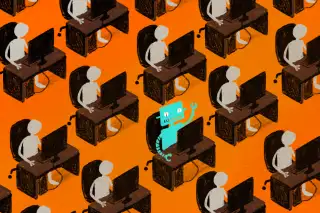Don't Blame AI for the Crummy Job Market — Yet

As the labor market cools, jobs are getting harder to come by, especially for young workers. Lately, artificial intelligence tools have been taking heat as the cause.
But a new study from Yale University’s Budget Lab and the Brookings Institution finds that it’s too soon to blame the hiring slowdown on AI. Underlying changes in the workforce actually predate the widespread adoption of ChatGPT.
“AI may make a huge difference in labor markets in the future,” says Martha Gimbel, executive director of The Budget Lab and co-author of the study, “but we currently don’t see any sign that it has done so at the macro level already.”
The study analyzed how other major technological advancements have changed the so-called occupational mix of the workforce. In other words, it compared how the composition of jobs in the U.S. economy changed in the years following the introduction of computers (1984), the internet (1996) and ChatGPT (2022).
Computers and the internet have undeniably changed the workforce over the past few decades. Generative AI is poised to do the same. But looking at the 33-month mark (roughly the amount of time ChatGPT has been widely available), AI’s impact thus far doesn’t look much different from the other technological advancements — or the 2016 benchmark period unrelated to any tech breakthroughs.
“Shifts in the occupational mix were well on their way during 2021, before the release of generative AI,” the report states, adding that “more recent changes do not seem any more pronounced” even as AI explodes in popularity.
Yet the study comes amid a flurry of anecdotes and lofty predictions that AI is upending the workforce — especially for recent college graduates.
For instance, the economic research firm Oxford Economics said in May that “there are signs that entry-level positions are being displaced by artificial intelligence at higher rates.” And more recently, Walmart CEO Doug McMillon made bold claims about AI at a workforce summit in September.
"It's very clear that AI is going to change literally every job," he said.
While the study from the Budget Lab and Brookings doesn’t attempt to predict the future, it lays clear that AI’s impact has been nearly indiscernible on the overall job market.
At least, for now.
“Historically, even the most disruptive technologies take time to have a large-scale impact on workers,” says Molly Kinder, a fellow at Brookings and another co-author of the study. “So far, it looks more like an evolution than an overnight jobs revolution.”
If AI isn't stealing jobs, what is?
While it’s too soon to point the finger at AI, the labor market is undeniably going through a transition.
“In my opinion, the more likely explanation for why new grad hiring is soft is that the overall job market is soft,” says Glassdoor chief economist Daniel Zhao, who was not involved in the study.
On one hand, the unemployment rate was 4.3% as of August, which is historically low. (The Labor Department did not release September numbers due to the ongoing government shutdown.)
On the other, interest rates have remained 4% or higher for nearly three years after hovering just above 0% following the Great Recession. High interest rates are primarily used to keep inflation in check, but they also tend to slow down the labor market because businesses direct more of their budgets toward interest payments, not staff.
When the job market starts to get rough, economists often think of young workers as the canaries in the coal mine, as the impact is typically sooner and more pronounced for them than more established career workers.
Right now, young workers and recent college grads aren’t doing so well.
“Our economy has seen hiring slow down markedly,” Gimbel says. “Hiring now looks more similar to 2011. That is not good for young workers.”
As of June, the unemployment rate for young workers was 7%, and for recent college grads, it was 4.8%, according to the most recent numbers from the New York Federal Reserve. At the time, the unemployment rate for workers of any education level was 4%.
For decades, recent college graduates have enjoyed lower unemployment rates than the overall population, but that’s no longer the case. AI is frequently blamed for the abnormally high unemployment rate for recent grads. But experts say something else is likely going on.
Too many grads?
One major culprit: There are simply a lot more college graduates these days.
According to the St. Louis Fed, nearly 40% of the workforce now has a bachelor’s degree or higher. That’s up from about a quarter of all workers in the early 2000s. As of 2021, just 22% of jobs required a bachelor's degree (and 36% required a four-year degree or higher).
Regardless of AI’s involvement, when there are more graduates than there are jobs that require grads, the unemployment and underemployment rates for this group increase. That's simple math.
A Money analysis of New York Fed data finds that recent college grads had lower unemployment rates (and often much lower) than the overall workforce going back to 1996, the earliest year on record. Then in 2018, the trend reversed.
The norm since then is that recent grads have had consistently higher unemployment rates than the general population. At the same time, the share of the workforce with a bachelor’s degree continued to march upward. Both developments predate widespread public use of AI by several years.
"The group of college graduates looks different than it did 20 years ago," Gimbel says, "and so we should expect the labor market outcomes to also look different."
More from Money:
Despite Economic Jitters, Employers Plan to Dole Out 3.5% Raises Next Year
4 Ways a Government Shutdown May Affect Your Money
6 Federal Services That Won't Be Affected by the Government Shutdown